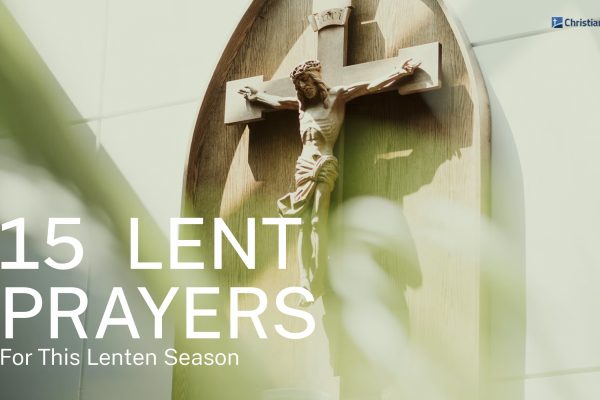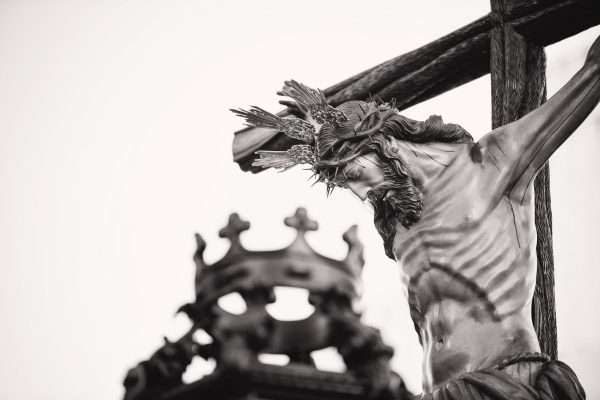Home>Special Themes>When Does The Lenten Fast End?


Special Themes
When Does The Lenten Fast End?
Published: February 28, 2024
Jason DeRose, Managing Editor at Christian.net, uses his expertise in religion and journalism to deepen understanding of faith's societal impacts. His editorial leadership, coupled with a strong academic background, enriches the platform’s diverse content, earning him recognition in both journalism and religious circles.
Discover when the Lenten fast ends and the significance of this special theme in the Christian calendar. Explore the traditions and practices associated with this important period of reflection and renewal.
(Many of the links in this article redirect to a specific reviewed product. Your purchase of these products through affiliate links helps to generate commission for Christian.net, at no extra cost. Learn more)
Table of Contents
The Significance of Lent in the Christian Tradition
Lent holds immense significance in the Christian tradition as it is a period of reflection, repentance, and spiritual growth. It is a time when Christians commemorate the 40 days that Jesus spent fasting in the wilderness, resisting temptation, and preparing for his ministry. This season is observed as a way for believers to emulate Jesus' spiritual discipline and to focus on their relationship with God. Lent is a solemn and reflective time that allows Christians to examine their lives, seek forgiveness for their shortcomings, and renew their commitment to living a life of faith.
-
Spiritual Preparation: Lent is a time for spiritual preparation leading up to the celebration of Easter. It provides an opportunity for believers to engage in self-examination, prayer, and acts of self-denial as a means of drawing closer to God.
-
Repentance and Renewal: During Lent, Christians are encouraged to repent for their sins and seek forgiveness. It is a period of introspection and a time to make amends, both with God and with others.
-
Fasting and Self-Denial: The practice of fasting during Lent is a way for believers to exercise self-discipline and detach from worldly distractions. By giving up certain luxuries or indulgences, individuals can focus on their spiritual growth and reliance on God.
-
Almsgiving and Acts of Charity: Lent also emphasizes the importance of charitable acts and helping those in need. Many Christians use this time to give to the less fortunate and engage in acts of service as a reflection of God's love and compassion.
-
Preparation for Easter: Ultimately, Lent serves as a period of preparation for the joyous celebration of Easter. By engaging in the Lenten disciplines of prayer, fasting, and almsgiving, Christians prepare their hearts to fully experience the significance of Christ's resurrection.
In summary, Lent holds deep significance in the Christian tradition as a time for spiritual reflection, repentance, and preparation for the celebration of Easter. It is a season that encourages believers to draw closer to God, seek forgiveness, and renew their commitment to living a life of faith and compassion.
Read more: When Does Advent Season End
Understanding the Lenten Fast
The Lenten fast is a central aspect of the Lenten season, symbolizing a period of self-discipline, spiritual reflection, and preparation for the celebration of Easter. The fast is characterized by abstaining from certain foods, engaging in acts of self-denial, and focusing on prayer and repentance. It is a time when Christians seek to emulate Jesus' 40-day fast in the wilderness and to draw closer to God through intentional sacrifice and devotion.
The Purpose of the Lenten Fast
-
Spiritual Discipline: The Lenten fast serves as a means of spiritual discipline, allowing individuals to exercise self-control and detach from worldly distractions. By abstaining from certain foods or activities, believers redirect their focus towards their spiritual well-being and reliance on God.
-
Identification with Christ: Through the Lenten fast, Christians identify with the suffering and sacrifice of Jesus Christ. By voluntarily giving up comforts and indulgences, believers enter into a period of solidarity with Christ's own self-denial and preparation for his ministry.
-
Repentance and Renewal: Fasting during Lent provides an opportunity for believers to repent for their sins and seek spiritual renewal. By engaging in acts of self-denial, individuals are reminded of their dependence on God's grace and are prompted to examine their lives with humility and contrition.
Types of Fasting
-
Abstaining from Certain Foods: Traditional Lenten fasting often involves abstaining from meat, dairy, and other rich foods. This practice varies among different Christian denominations and may also include restrictions on specific days of the week, such as Ash Wednesday and Good Friday.
-
Modified Dietary Practices: Some individuals may choose to modify their dietary habits during Lent, opting for simpler meals, smaller portions, or refraining from particular food items as a form of self-discipline and spiritual focus.
-
Fasting from Non-Food Items: In addition to dietary restrictions, the Lenten fast may extend to non-food items, such as entertainment, social media, or other personal indulgences. This broader approach to fasting encourages believers to examine all aspects of their lives and make intentional choices that foster spiritual growth.
The Spiritual Impact
The Lenten fast is not merely a physical practice but a spiritual journey that fosters self-awareness, humility, and a deeper connection with God. By embracing the disciplines of fasting, Christians open themselves to a heightened awareness of their spiritual needs, a greater sensitivity to the needs of others, and a renewed commitment to living out their faith in practical ways.
In essence, the Lenten fast is a profound expression of devotion and self-sacrifice, inviting believers to engage in intentional acts of fasting, prayer, and repentance as they prepare their hearts to fully experience the joy and significance of Easter.
Read more: When Does Giving Up Something For Lent End
Practices and Observances During Lent
During the Lenten season, Christians engage in various practices and observances that are integral to their spiritual journey and preparation for Easter. These practices are designed to foster a deeper connection with God, encourage self-reflection, and promote acts of compassion and service towards others. Here are some of the key practices and observances that are commonly observed during Lent:
-
Prayer and Meditation: Prayer holds a central place in the Lenten observance, as it provides believers with a means of communicating with God, seeking guidance, and finding solace in times of introspection. Many Christians use this time to engage in more frequent and intentional prayer, often incorporating meditation and reflection on the life and teachings of Jesus Christ.
-
Attending Worship Services: Lent is a time when Christians are encouraged to participate in regular worship services, including Ash Wednesday, Maundy Thursday, Good Friday, and other special services that focus on the themes of repentance, sacrifice, and the journey to the cross. These gatherings offer opportunities for communal prayer, reflection on scripture, and the sharing of spiritual insights.
-
Acts of Self-Denial: In keeping with the spirit of self-discipline and sacrifice, many believers choose to practice acts of self-denial during Lent. This may involve giving up certain luxuries, habits, or activities that detract from their spiritual focus. By embracing self-denial, individuals seek to redirect their attention towards their relationship with God and the needs of others.
-
Almsgiving and Charitable Works: Lent emphasizes the importance of charitable acts and service to those in need. Many Christians use this time to engage in acts of generosity, such as donating to charitable organizations, volunteering in their communities, or reaching out to individuals who are marginalized or struggling. These acts of compassion reflect the love and mercy of God and serve as a tangible expression of faith in action.
-
Studying Scripture and Spiritual Reading: Lent provides an opportunity for believers to delve deeper into the teachings of the Bible and engage in spiritual reading that nurtures their faith. Many individuals use this time to study the life of Jesus, explore the themes of repentance and redemption, and seek a deeper understanding of their Christian identity.
-
Fasting and Abstinence: As discussed earlier, fasting and abstinence from certain foods or activities are common practices during Lent. These disciplines serve as a means of self-discipline, spiritual focus, and identification with the suffering of Christ. By embracing fasting, individuals seek to cultivate a heightened awareness of their spiritual needs and reliance on God's grace.
In summary, the practices and observances during Lent are designed to facilitate a transformative spiritual experience, leading believers to a deeper understanding of their faith, a renewed commitment to living out their beliefs, and a preparation for the celebration of Easter. Through prayer, self-denial, acts of charity, and engagement with scripture, Christians seek to draw closer to God and embody the values of compassion, humility, and grace exemplified by Jesus Christ.
The Duration of the Lenten Fast
The duration of the Lenten fast is a significant aspect of the Lenten season, marking a period of 40 days that holds deep spiritual symbolism within the Christian tradition. This period of 40 days is derived from the biblical accounts of Jesus' 40-day fast in the wilderness, during which he faced temptation and prepared for his ministry. The duration of the Lenten fast begins on Ash Wednesday and concludes on Holy Saturday, the day before Easter Sunday. This 40-day period is reflective of the 40 days that Jesus spent fasting and praying, and it holds profound spiritual significance for believers as they engage in acts of self-discipline, repentance, and preparation for the celebration of Easter.
The Biblical Significance
The 40-day duration of the Lenten fast is rooted in the biblical narratives found in the Gospels of Matthew, Mark, and Luke, which describe Jesus' withdrawal into the wilderness for a period of fasting and spiritual testing. This period of 40 days is symbolic of significant events in the Old Testament, such as the 40 days of rain during the flood in the time of Noah, and the 40 years of Israel's wandering in the wilderness. In the Christian tradition, the number 40 is often associated with a time of testing, preparation, and spiritual transformation, making it a fitting duration for the Lenten fast.
Ash Wednesday to Holy Saturday
The Lenten fast commences on Ash Wednesday, which marks the beginning of the Lenten season. On this day, many Christians receive ashes on their foreheads as a sign of repentance and mortality, symbolizing the call to turn away from sin and embrace the gospel. From Ash Wednesday, believers observe a period of 40 days, excluding Sundays, as Sundays are considered celebrations of the resurrection and are not included in the count of Lenten days. The Lenten fast concludes on Holy Saturday, the day before Easter Sunday, which is a time of solemn reflection on the death of Jesus and the anticipation of his resurrection.
Read more: What Is A Lenten Service?
Sundays in Lent
Sundays within the Lenten season hold a unique significance, as they are considered mini-celebrations of the resurrection of Christ. For this reason, Sundays are not included in the 40-day count of Lent. Instead, they are observed as days of joy and worship, providing believers with moments of spiritual refreshment and encouragement as they journey through the Lenten disciplines. This practice acknowledges the victory of Christ over sin and death, infusing the Lenten period with a sense of hope and anticipation.
Spiritual Reflection and Preparation
The 40-day duration of the Lenten fast serves as a time of spiritual reflection, self-examination, and preparation for the celebration of Easter. It offers believers an extended period to engage in acts of self-discipline, prayer, and repentance, as they seek to draw closer to God and align their lives with the teachings of Jesus. The Lenten fast provides a structured framework for believers to cultivate a deeper awareness of their spiritual needs, a heightened sense of gratitude for God's grace, and a renewed commitment to living out their faith in practical ways.
In essence, the 40-day duration of the Lenten fast encapsulates a season of spiritual significance, inviting believers to journey alongside Jesus in his wilderness experience, to confront their own temptations and shortcomings, and to emerge with a renewed sense of purpose and devotion as they approach the celebration of Easter.
The Culmination of the Lenten Fast
The culmination of the Lenten fast is marked by the observance of Holy Week, a sacred period that leads up to the celebration of Easter. Holy Week begins with Palm Sunday, which commemorates Jesus' triumphant entry into Jerusalem, and concludes with the solemn observances of Maundy Thursday, Good Friday, and Holy Saturday. Each of these days holds profound significance in the Christian faith, representing key events in the final days of Jesus' earthly ministry and the fulfillment of God's redemptive plan.
Palm Sunday
Palm Sunday serves as the commencement of Holy Week, recalling the moment when Jesus entered Jerusalem and was greeted with shouts of "Hosanna" by the crowds, who waved palm branches as a symbol of honor and praise. This day signifies the beginning of the final week of Lent and sets the stage for the events that will unfold in the days to come.
Maundy Thursday
Maundy Thursday, also known as Holy Thursday, commemorates the Last Supper, the final meal that Jesus shared with his disciples before his crucifixion. It is a time when Christians reflect on the significance of the Eucharist, the act of foot-washing performed by Jesus, and the new commandment to love one another as he has loved them. Maundy Thursday also marks the beginning of the Easter Triduum, a period of three days that leads to Easter Sunday.
Good Friday
Good Friday is a day of solemn remembrance, marking the crucifixion and death of Jesus Christ. It is a time for believers to contemplate the profound sacrifice of Jesus on the cross, his willingness to bear the sins of humanity, and the redemptive power of his atoning death. Many Christians participate in services of worship and reflection, engaging in prayer, scripture readings, and meditations on the suffering and death of Christ.
Holy Saturday
Holy Saturday is a day of anticipation and waiting, as it represents the time between Jesus' crucifixion and his resurrection. It is a period of quiet reflection, acknowledging the grief and uncertainty experienced by the disciples following the death of Jesus. For believers, Holy Saturday serves as a time of vigil, as they await the dawn of Easter and the fulfillment of God's promise of new life and hope.
The Joy of Easter
The culmination of the Lenten fast reaches its pinnacle with the celebration of Easter, the most significant event in the Christian calendar. Easter Sunday marks the resurrection of Jesus Christ, triumphing over death and offering the promise of salvation and eternal life. It is a day of joyous celebration, as believers gather to proclaim the resurrection, sing hymns of praise, and rejoice in the hope that Christ's victory brings to the world.
In essence, the culmination of the Lenten fast through Holy Week and the celebration of Easter represents the climax of the Christian faith, encapsulating the journey from repentance and self-denial to the triumph of redemption and new life in Christ. It is a time for believers to embrace the fullness of the gospel message, to reflect on the depth of God's love and grace, and to rejoice in the transformative power of the resurrection.












